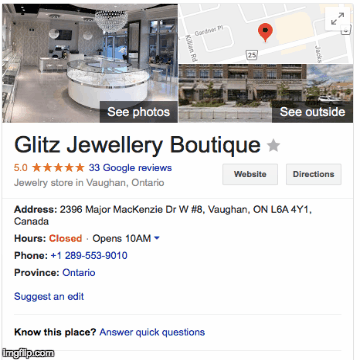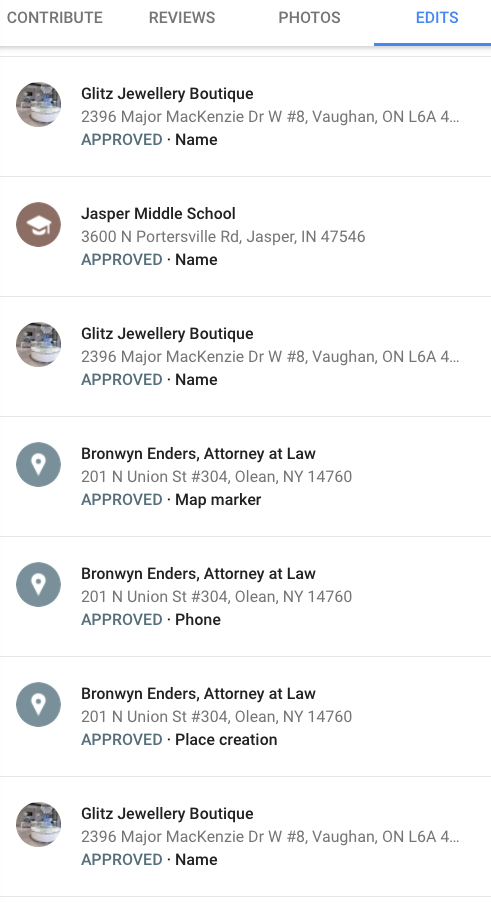Understanding Google My Business & Local Search
Google My Business Guidelines are Like Traffic Signals to New Yorkers – A (Very) Rough Suggestion
 To paraphrase David Letterman, Google My Business Guidelines are like traffic signals to New Yorkers… just a rough suggestion.
To paraphrase David Letterman, Google My Business Guidelines are like traffic signals to New Yorkers… just a rough suggestion.
Google clearly states in the guidelines that “your name should reflect your business’ real-world name, as used consistently on your storefront, website, stationery, and as known to customers. Accurately representing your business name helps customers find your business online….Including unnecessary information in your business name is not permitted, and could result in your listing being suspended.”
In this case the definition of “should” and “could” are sort of like Clinton and his verbal gymnastics around what the meaning of the word “is” is. Like “is” with Clinton, the words “should” and “could” do in fact have meaning in both objective reality and in the Google My Business Guidelines. The only problem is that they are different in both places. And it isn’t clear that Google ever plans to inform us of their intended meaning.
How do I know and many small businesses know this? Experience.
The telling example that comes to mind is a jeweler near Toronto. About once per quarter I blog about this and about once every month or two or three I edit their listing to the actual name, it gets approved and then shortly there after it returns to its adopted name. It’s quite an adoption too. It includes brothers, sisters and the kitchen sink as “Glitz Jewellery Boutique” becomes “Glitz Jewellery Boutique – Engagement rings, diamond jewellery and gifts in Vaughan” shortly after my many interventions.
For the record my edits have been approved by Google SIX times. The owners of the listing are probably swearing at Google for the ever changing suggestion in their GMB. Well at least they are visiting it often.
My only wish in this whole sisyphean tale is that my Local Guide edits counted as frequent flier miles instead of just the lame points I do accrue. I could at least be close to a vacation in some exotic place by now.

© Copyright 2025 - MIKE BLUMENTHAL, ALL RIGHT RESERVED.
Comments
13 Comments
I’ve been in the camp who believe businesses should be punished or demoted or flagged if they spam the business name field as bad as your example. Does that mean that I should also be in favor of jail time for traffic violations in Manhattan?
In your example, the spammy business name is 83 characters. So clearly there is a simply fix that Google could do to eliminate a good portion of all ridiculous business names. They used to have a character limit – what was it? 40? 30?
In light of Google’s incredibly light and mostly non enforced rules, an SMB or a competitor to an SMB can continuously make efforts to either spam the name, or alternatively ruin the reputation of a competitor by merely being persistent.
There are no penalties and no enforcement efforts. The public and competitors suffer when there is no effort on Google’s behalf.
@dave
It’s interesting how their enforcement on this has cycled to zero when in the past there was at least a patina of effort.
You have a sense of the ups and downs of google “enforcement”, responsiveness, spam fighting over time.
It seems their changes are completely independent of any outside influences or how bad things are.
They are their own source of power completely independent of the outside world.
@Dave
It seems to revolve around people that want to take on the project as much as anything. Which, being “independent of any outside influences or how bad things are” is problematic for sure.
I have the feeling they have to be coming up with some sort of resolution to this – they know it exists – they know it is rampant and bad – and it’s just too easy to game as it is.
The name acrobatics are somewhat annoying but if Google ever wants to change behavior then they need to clearly define it with more concrete language than “should”. They’re also going to have to do something of a punishment (even if temporarily minor) for those who continuously offend. Until then, good luck making any changes for long.
@Jorge
They do give explicit examples of what shouldn’t be done. So I don’t think clarity is the issue. Its definitely on the punishment side. At the moment, businesses are not just not punished but are in fact rewarded.
Here are the specifics (fyi)
I have a term for when you’re the person who is following the rules and everyone else seems to be breaking the rules and getting away with it: I say that I am paying a “chump tax” because I feel like I’m a chump for following the rules.
By the way, the same concept feels like it applies to obeying some laws that are on the books, but that’s a different discussion for a different place and time.
@Tim
Remind me to get off the road when we are in the same city.
No, you’re safe, Mike. I’m the chump who is following the rules, remember.
I’ve actually had business school professors (40+ years ago) who said that stopping for stop signs is stupid when no one else is around.
Google Local Frequent Flyer Points Program… now THAT’S a program I could get behind!
Crazy how easy it is for the name can be changed back after so many name suggestions. – As long as it remains a benefit for the business to use those keywords, or at least as long as there is a perceived benefit, sadly I don’t see this going away anytime soon. Thanks for another great post, Mike!
Quite the elephant in the room..
Rewarding = by-and-large encouraging.
I need to try this out myself, see what I can get away with.
Great post by the way!
-Hayden
Comments for this post are closed.